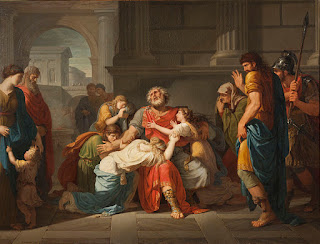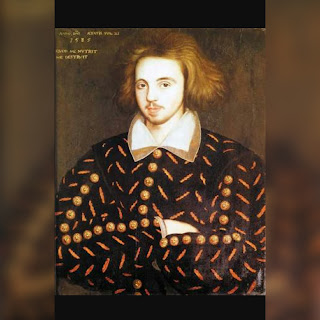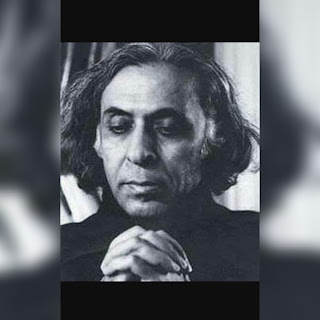Thinking Activity: "Waiting For Godot"
Hello Readers,
This blog is part of my studies.And this blog is given by Dr.Dilip BaradSir. Click here to read main task.
This blog is part of my studies.And this blog is given by Dr.Dilip BaradSir. Click here to read main task.
· What connection do you see in the setting (“A country road. A tree.Evening.”) of the play and these paintings?
The painting by Casper David Friedrich, suggests the hope with the symbols of country road and tree evening. And the symbol of the country road indicates the absurdity, nothing happens, no one is coming, there is all absurdity. In the film if we look at the roads it is full of the debris, which we can say the effect of world war.And also it is connected with the time.Time never stops for anyone.Time always moves on.
· The tree is the only important ‘thing’ in the setting. What is the importance of tree in both acts? Why does Beckett grow a few leaves in Act II on the barren tree - The tree has four or five leaves - ?
In both, the play and film there is nothing changes but the tree has leaves that is the only things changed, because the change is the main concern of the nature. In the act-II there is four or five leaves on the tree. It suggests that as time passes our life also goes on so we have to aware about, what we need to change.
 |
| Leaves on Tree - Waiting for Godot |
In both, the play and film there is nothing changes but the tree has leaves that is the only things changed, because the change is the main concern of the nature. In the act-II there is four or five leaves on the tree. It suggests that as time passes our life also goes on so we have to aware about, what we need to change.
· In both Acts, evening falls into night and moon rises. How would you like to interpret this ‘coming of night and moon’ when actually they are waiting for Godot?
 |
| Night and Moon - Waiting for Godot |
Night as symbol of sleeping or we can say half death as Northrop Frey suggests the cycling season, in which night as death. They both are waiting whole day but no one is coming, and moon rises. As the play based on absurdity, there is nothing happens, they are keep waiting for Cycle of time changing but nothing happens.
· The director feels the setting with some debris. Can you read any meaning in the contours of debris in the setting of the play?
The play is written around first world war and the debris used in the sense of destruction. How war destroyed the human life. All the streets are full of debris.
The play is written around first world war and the debris used in the sense of destruction. How war destroyed the human life. All the streets are full of debris.
· The play begins with the dialogue “Nothing to be done”. How does the theme of ‘nothingness’ recurs in the play?
Nothingness has some meaning, the play starts with this idea. Waiting itself suggests the life wheather we wait for Godot or God. Life itself is nothing but waiting for something. Ultimately the death is end. The waiting has nothingness, and we can see this in very beginning, "Nothing to be done" said by Estragon. Both are doing something to kill the time.
· Do you agree: “The play (Waiting for Godot), we agreed, was a positive play, not negative, not pessimistic. As I saw it, with my blood and skin and eyes, the philosophy is: 'No matter what— atom bombs, hydrogen bombs, anything—life goes on. You can kill yourself, but you can't kill life." (E.G. Marshal who played Vladimir in original Broadway production 1950s)?
We can properly say that the play is negative, pessimistic or positive, but it has some remarkable points. It reflects the human desires that we constantly waiting for something who will save us, and free us from this cage of body. The play refers some biblical ideas and all the dialogues are deeply rooted from Bible.
We can properly say that the play is negative, pessimistic or positive, but it has some remarkable points. It reflects the human desires that we constantly waiting for something who will save us, and free us from this cage of body. The play refers some biblical ideas and all the dialogues are deeply rooted from Bible.
· How are the props like hat and boots used in the play? What is the symbolical significance of these props?
Hat is the symbol of thinking, it preferes the mind, Vladimir has a hat and Estragon has boots. Boot as the symbol of nothingness. Through the characters of Vladimir and Estragon writer shows contradiction. Vladimir who has deep insane personality, serious about life and thinking about life and Estragon, who always busy with material kind of things. His character suggests the materialistic mentality, he is not spiritual and more bodily. The symbols of hat and boots are used in a significant way.
Hat is the symbol of thinking, it preferes the mind, Vladimir has a hat and Estragon has boots. Boot as the symbol of nothingness. Through the characters of Vladimir and Estragon writer shows contradiction. Vladimir who has deep insane personality, serious about life and thinking about life and Estragon, who always busy with material kind of things. His character suggests the materialistic mentality, he is not spiritual and more bodily. The symbols of hat and boots are used in a significant way.
· Do you think that the obedience of Lucky is extremely irritating and nauseatic? Even when the master Pozzo is blind, he obediently hands the whip in his hand. Do you think that such a capacity of slavishness is unbelievable?
Yes, as I shaw the film I think the obedience of Lucky is extremely irritating and nauseatic. When his master becomes blind he has chance to run away but he didn't do that. We also like Lucky, we all have chance to free from the slavery but we are act like Lucky. It raises the question on existence. We are tied up with some kind of rope from which we don't want to free.
 |
| Pozzo - Lucky: Master-Slave |
· Who according to you is Godot? God? An object of desire? Death? Goal? Success? Or . . .
According to me, Godot is the an object of desire. We constantly thinking about the meaning of life, we want to achieve goals, become successful. But the the ultimate end is death, so everyone wanted that we all are become free from the meaningless life. So, the Godot is our medium to reach the celestial city, in which the journey of body to soul.
According to me, Godot is the an object of desire. We constantly thinking about the meaning of life, we want to achieve goals, become successful. But the the ultimate end is death, so everyone wanted that we all are become free from the meaningless life. So, the Godot is our medium to reach the celestial city, in which the journey of body to soul.
· “The subject of the play is not Godot but ‘Waiting’” (Esslin, A Search for the Self) . Do you agree? How can you justify your answer?
Here waiting is endless because, we constantly waiting for Godot and he will never come, he sent his messenger as in the play, Godot sent the boy, to says that he will come tomorrow. As it is we keep waiting for Godot and our ultimate aim is waiting, to the last breath. So, the subject of the play is not Godot but 'waiting'.
Here waiting is endless because, we constantly waiting for Godot and he will never come, he sent his messenger as in the play, Godot sent the boy, to says that he will come tomorrow. As it is we keep waiting for Godot and our ultimate aim is waiting, to the last breath. So, the subject of the play is not Godot but 'waiting'.
· Do you think that plays like this can better be ‘read’ than ‘viewed’ as it requires a lot of thinking on the part of readers, while viewing, the torrent of dialogues does not give ample time and space to ‘think’? Or is it that the audio-visuals help in better understanding of the play?
It is true that audio and visuals are helping in the understanding of the play, but when we read the play it requires lots of thinking. If we read the play it gives different imagination, which is our own thinking process. And when we take a help of audio and visuals the characters are given their own imagery and we learnt the expression of the characters. So, the audio and visuals are quite helpful to understand the play and characters as well.
It is true that audio and visuals are helping in the understanding of the play, but when we read the play it requires lots of thinking. If we read the play it gives different imagination, which is our own thinking process. And when we take a help of audio and visuals the characters are given their own imagery and we learnt the expression of the characters. So, the audio and visuals are quite helpful to understand the play and characters as well.
· Which of the following sequence you liked the most:
o Vladimir – Estragon killing time in questions and conversations whilewaiting
 |
| Vladimir and Estragon: The Had and the Boot |
o Pozzo – Lucky episode in both acts
o Converstion of Vladimir with the boy
Boy comes to tell that Godot will come tomorrow. Vladimir keep questioning him about Godot, it is quite interesting.
Boy comes to tell that Godot will come tomorrow. Vladimir keep questioning him about Godot, it is quite interesting.
VLADIMIR: (softly). Has he a beard, Mr. Godot?
BOY: Yes Sir.
VLADIMIR: Fair or . . . (he hesitates) . . . or black?
BOY: think it's white, Sir.
Silence.
VLADIMIR: Christ have mercy on us!
Vladimir is very curious to know about him and his conversation with boy is very significant.
· Did you feel the effect of existential crisis or meaninglessness of human existence in the irrational and indifference Universe during screening of the movie? Where and when exactly that feeling was felt, if ever it was?
Yes, when Lucky and Pozzo enters it gives different effect of existence of Lucky. We can even tolerate the slavishness of Lucky. Pozzo treats Lucky as a slave, it raises the question on existential crises. How Lucky make himself slave for the piece of bones.
Yes, when Lucky and Pozzo enters it gives different effect of existence of Lucky. We can even tolerate the slavishness of Lucky. Pozzo treats Lucky as a slave, it raises the question on existential crises. How Lucky make himself slave for the piece of bones.
· Vladimir and Estragon talks about ‘hanging’ themselves and commit suicide, but they do not do so. How do you read this idea of suicide inExistentialism?
Vladimir says that they will hang themselves tomorrow unless Godot comes to solve them. They doing the fun to kill the time. As I have seen the video in the context of suicide, this line is very significant, “An elegant suicide is an ultimate work of art” it’s an art, so here Vladimir and Estragon talks about commit suicide but they do not do that, and keep postponing in the wait of Godot.
Samuel Beckett is an Irish writer, who has problem with British people. He portrayed Lucky (England) as slave, which shows the hatred towards the Britishers, because they are overpowering on the Scottish. They are known as celtic, they are not like English people and they have different literature. Write written with postcolonial mindset.
• So far as Pozzo and Lucky [master and slave] are concerned, we have to remember that Beckett was a disciple of Joyce and that Joyce hated England. Beckett meant Pozzo to be England, and Lucky to be Ireland." (Bert Lahr who played Estragon in Broadway production). Does this reading make any sense? Why? How? What?
Pozzo and Lucky both are in master slave relationship which is fully described here. After the blindness of his master ( Pozzo) Lucky can't be free because he doesn't want. So, Ireland always be slave of England and we read this with colonial perspective.
The more the things change, the more it remains similar. There seems to have no change in Act I and Act II of the play. Even the conversation between Vladimir and the Boy sounds almost similar. But there is one major change. In Act I, in reply to Boy;s question, Vladimir says:
"BOY: What am I to tell Mr. Godot, Sir?
Vladimir says that they will hang themselves tomorrow unless Godot comes to solve them. They doing the fun to kill the time. As I have seen the video in the context of suicide, this line is very significant, “An elegant suicide is an ultimate work of art” it’s an art, so here Vladimir and Estragon talks about commit suicide but they do not do that, and keep postponing in the wait of Godot.
- Can we do any political reading of the play if we see European nations represented by the 'names' of the characters (Vladimir - Russia; Estragon - France; Pozzo - Italy and Lucky - England)? What interpretation can be inferred from the play written just after World War II? Which country stands for 'Godot'?
Samuel Beckett is an Irish writer, who has problem with British people. He portrayed Lucky (England) as slave, which shows the hatred towards the Britishers, because they are overpowering on the Scottish. They are known as celtic, they are not like English people and they have different literature. Write written with postcolonial mindset.
• So far as Pozzo and Lucky [master and slave] are concerned, we have to remember that Beckett was a disciple of Joyce and that Joyce hated England. Beckett meant Pozzo to be England, and Lucky to be Ireland." (Bert Lahr who played Estragon in Broadway production). Does this reading make any sense? Why? How? What?
Pozzo and Lucky both are in master slave relationship which is fully described here. After the blindness of his master ( Pozzo) Lucky can't be free because he doesn't want. So, Ireland always be slave of England and we read this with colonial perspective.
"BOY: What am I to tell Mr. Godot, Sir?
VLADIMIR:
Tell him . . . (he hesitates) . . . tell him you saw us. (Pause.) You did see us, didn't you?
How does this conversation go in Act II? Is there any change in seeming similar situation and conversation? If so, what is it? What does it signify?
The conversation between Vladimir and boy is quite interesting. Vladimir is very eager to know about Godot that's why he constantly telling to the boy. In act-II he asking to boy that the Godot has beared or not, he is dark or fair, so it suggests the complexity of the human nature.
The conversation between Vladimir and boy is quite interesting. Vladimir is very eager to know about Godot that's why he constantly telling to the boy. In act-II he asking to boy that the Godot has beared or not, he is dark or fair, so it suggests the complexity of the human nature.




Good job
ReplyDelete